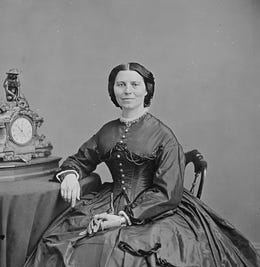|
 |
TWA from Sunday, May 21, 2017
“Observations of an OB/GYN Nurse” by Lois Parker Edstrom from Night Beyond Black. © Moon Path Press, 2016.
ORIGINAL TEXT AND AUDIO - 2017
It is the birthday of French painter Henri Rousseau, born in Laval, France (1844). Rousseau was a mediocre student, but excelled at drawing and music. He worked for a lawyer, served in the army for four years, and eventually went to work for the government as a tax collector. He married twice and had six children, only one of whom survived. He didn't start painting until he was in his early 40s, and he retired at age 49 to work on painting full time.
He often painted primitive-style jungle scenes, and his work was misunderstood and ridiculed in his lifetime, although he had an admirer in Picasso. In the fall of 1908, Picasso was strolling down the rue de Martyrs in Montmartre when he noticed a portrait of a woman among a stack of canvases for sale outside a junk shop. The proprietor told Picasso that the canvas could be painted over and reused. But Picasso knew the work was a Rousseau and purchased it. He told a friend that the portrait of a woman "took hold of me with the force of obsession. ... It is one of the most psychologically truthful of all French portraits." Picasso even held a party a few weeks later to celebrate his acquisition of the Rousseau and one of Picasso's friends wrote a song for the occasion.
On this day in 1881, Clara Barton founded the American Red Cross.
When Clara was only 10, her brother David fell off the roof of the family barn. At first, he seemed fine, but the next day he developed a headache and fever. The doctor diagnosed "too much blood" and prescribed the application of leeches to help draw out the extra blood. Clara took over as her brother's nurse and spent two years at his bedside applying leeches (though David did not get any better until he tried an innovative "steam therapy" several years later).
As a girl, Clara was shy and had a stutter, and her worried mother asked a phrenologist (phrenologists, who were fairly common in the 1800s, examined the bumps on a person's skull as a way to determine their personality traits) to help her. The phrenologist said that she was shy and retiring and that the solution to her problem was to become a schoolteacher. Barton did not want to teach but she began teaching in 1839 at the age of 18. She overcame her shyness, became a sought-after teacher, and believed in the value of her work. She once said, "I may sometimes be wiling to teach for nothing, but if paid at all, I shall never do a man's work for less than a man's pay."
Several men proposed to Barton, but she remained single her whole life, at one point telling her nephew that on the whole she felt that she had been more useful to the world by being free from matrimonial ties.
In 1854, she gave up teaching and took a job in the United States Patent Office in Washington, D.C. She worked hard, got promoted, and within a year was making a salary equal to the men in the office (which angered the men). She left Washington for three years when the administration changed, but she returned in the early 1860s and resumed her job in the Patent Office. By 1861, war was breaking out, and when supporters of the Confederacy attacked Union soldiers in Washington, D.C., Clara helped nurse wounded soldiers in the same way she had nursed her brother when they were young.
During one of the first major engagements of the war, the Battle of Bull Run, the Union suffered a staggering defeat and as Clara read reports of the battle she realized that the Union Army had not seriously considered or provided for wounded soldiers. She began to ride along in ambulances, providing supplies and comfort to wounded soldiers on the frontlines.
After the war, she traveled to Geneva, Switzerland, where she learned about the International Red Cross and its mission to be a neutral organization that helped wounded soldiers. When Barton returned to the United States, she pressed for the creation of a national branch of the Red Cross. But many people thought there would never again be a war as monumental and devastating as the Civil War and didn't see the need for the Red Cross. Barton finally convinced the Arthur administration that the Red Cross could be used in other crises.
The American Red Cross was officially incorporated on this day, with Barton as its president.
Clara Barton said, "I may be compelled to face danger, but never fear it, and while our soldiers can stand and fight, I can stand and feed and nurse them."
And she said, "The door that nobody else will go in at, seems always to swing open widely for me."
She also said, "Everybody's business is nobody's business, and nobody's business is my business."
Be well, do good work, and keep in touch.®
This daily newsletter is FREE but we do welcome financial support to help keep the operations going.
You can support us in a number of ways:
Click on UPGRADE TO PAID
Select an option through our shop - CLICK HERE
Send a check to: Prairie Home Productions, P.O. Box 2090, Minneapolis, MN 55402 (add your email, so we can manually upgrade you on Substack)
You’re a free subscriber to The Writer's Almanac with Garrison Keillor. Your financial support is used to maintain these newsletters, websites, and archive. Support can be made through our garrisonkeillor.com store, by check to Prairie Home Productions P.O. Box 2090, Minneapolis, MN 55402, or by clicking the SUBSCRIBE button. This financial support is not tax deductible.

